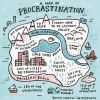-
 +15 +1
+15 +1Unhappy? Sleep it off, says new UBC study
Happiness might seem in short supply these days as the COVID-19 pandemic stretches on: “fewer faces in bigger spaces,” smaller bubbles, less socializing and last call at 10 p.m. However, that early cutoff time at the bar just might do everyone some good. A new study on sleep deprivation by University of B.C. researcher and health psychologist Nancy Sin shows that if you don’t get enough sleep, not only are the lows lower, the highs are also lower as well.
-
 +15 +1
+15 +1Our Ability To Perceive Musical Beat Becomes More Refined Through Childhood
If you were to play your favourite song right now, I imagine you’d have little difficulty clapping along with the beat. Our appreciation of beat allows us to clap, dance, march and sway in time with a piece of music — or just with each other. As the authors of a new paper published in the Journal of Experimental Psychology: General point out, these behaviours occur spontaneously across human cultures. But while moving to a beat seems effortless, it involves all kinds of perceptual processes.
-
 +28 +1
+28 +1The key to happiness: Friends or family? The answer might surprise you
Think spending time with your kids and spouse is the key to your happiness? You may actually be happier getting together with your friends, said SMU psychology professor Nathan Hudson. Hudson's research finds that people report higher levels of well-being while hanging with their friends than they do with their romantic partner or children. In fact, being around romantic partners predicted the least amount of happiness among these three groups, reveals a study published in the Journal of Personality and Social Psychology.
-
 +12 +1
+12 +1The Dark Core of Personality
Over 100 years ago Charles Spearman made two monumental discoveries about human intelligence. First, a general factor of intelligence (g) exists: people who score high on one test of intelligence also tend to score high on other tests of intelligence. Second, Spearman found that the g-factor conforms to the principle of the "indifference of the indicator": It doesn't matter what test of intelligence you administer; as long as the intelligence test is sufficiently cognitively complex and has enough items, you can reliably and validly measure a person's general cognitive ability.
-
 +4 +1
+4 +1Why is Rational Decision Making Difficult?
A blog about mental health and well-being.
-
 +13 +1
+13 +1Why we eat meat without guilt, but hate seeing animal slaughter
When I ate meat, if someone were to have asked me if I loved animals, I would have said an enthusiastic ‘yes!’ After all, I adored playing with dogs and cats I would come across, enjoyed feeding squirrels and birds with my grandmother and liked watching wildlife documentaries with my father.
-
 +17 +1
+17 +1Brain Scans Show Why Our Mind's Eye Sees The World So Differently to Everyday Vision
Researchers have discovered a neural overlap between human and machine that helps to explain why what we see in our mind's eye is different to the information being processed by our actual eyes when we're peering at something in reality.
-
 +3 +1
+3 +1What makes people stop caring?
“If I look at the mass I will never act. If I look at the one, I will." These are the words of a woman whose acts of charity and kindness earned her sainthood – Mother Theresa. They exemplify one of the most baffling aspects of the human response to the plight of others. While most of us will see a single death as a tragedy, we can struggle to have the same response to large-scale loss of life. Too often, the deaths of many simply become a statistic.
-
 +21 +1
+21 +1COVID-19 lockdowns helped people get more, but not necessarily better, sleep
Lockdowns haven’t just curbed coronavirus transmission — they’ve also helped people get more sleep. Two studies, both published June 10 in Current Biology, report that people began sleeping more and more regularly every night after countries imposed stay-at-home orders to slow the spread of the coronavirus. But that sleep may not have been of the best quality, one of those studies finds.
-
 +3 +1
+3 +1Why ‘stillness’ is crucial for your brain during this pandemic
A lot of messages are being thrown at us during this pandemic. One of them is this idea that we should all be optimizing our time in quarantine, that we should seize the opportunity to be productive. Social media posts taunt us: “Write that business plan you’ve been meaning to.” “Did you know Shakespeare wrote King Lear during quarantine?” “If you don’t come out of quarantine with a new skill, you didn’t ever lack time… you lacked discipline.”
-
 +14 +1
+14 +1The Dark Core of Personality
Over 100 years ago Charles Spearman made two monumental discoveries about human intelligence. First, a general factor of intelligence (g) exists: people who score high on one test of intelligence also tend to score high on other tests of intelligence. Second, Spearman found that the g-factor conforms to the principle of the "indifference of the indicator": It doesn't matter what test of intelligence you administer; as long as the intelligence test is sufficiently cognitively complex and has enough items, you can reliably and validly measure a person's general cognitive ability.
-
 +15 +1
+15 +1Science fiction builds mental resiliency in young readers
Fantasy fiction provides more than escapism for young readers.
-
 +5 +1
+5 +1When Does Suicide Happen?
Around the globe, over 800,000 people die from suicide each year. While health professionals and others cannot prevent all suicides, evidence suggests suicide can be prevented, and effective prevention strategies already exist. Efforts to prevent suicide and research on suicide prevention have focused on the reduction of access to methods of suicide1 and risk factors...
-
 +4 +1
+4 +1Origins of language pathway in the brain at least 25 million years old
Scientists have discovered an earlier origin to the human language pathway in the brain, pushing back its evolutionary origin by at least 20 million years. Previously, a precursor of the language pathway was thought by many scientists to have emerged more recently, about 5 million years ago, with a common ancestor of both apes and humans.
-
 +11 +1
+11 +1Having Too Much Information Can Lead Us To Make Worse Decisions
Ensuring you’re well-informed before making a choice is, on the whole, a sensible thing to do. This is especially true of big decisions — just pretending you’ve read the terms and conditions of a new website might be okay, but we’re unlikely to be so lax about our health or finances.
-
 +19 +1
+19 +1One week of mindfulness training can reduce paranoia
A recent study found that practicing mindfulness, even over a short period, reduces feelings of paranoia. The study, which was published in Mindfulness, also showed which particular aspect of mindfulness is the one linked to predicting levels of paranoia.
-
 +3 +1
+3 +1Fabricating curiosity
‘All men by nature desire to know’¹, this is how Aristotle began his work “Metaphysics” and this has been established as the standard philosophical definition of curiosity — ‘a desire to know’. Curiosity is tied to motivation and understanding how and what motivates us to learn might lead us to understand why we find it valuable.
-
 +3 +1
+3 +1In Brain Waves, Scientists See Neurons Juggle Possible Futures
Decisions, decisions. All of us are constantly faced with conscious and unconscious choices. Not just about what to wear, what to eat or how to spend a weekend, but about which hand to use when picking up a pencil, or whether to shift our weight in a chair.
-
 +6 +1
+6 +1What Your Anger May Be Hiding
The heading above (which, half-seriously, I've contemplated submitting to various quotation dictionaries) aptly sums up my professional experience working with this so very problematic emotion. In the past 20+ years I've taught well over a hundred classes and workshops on anger management and delivered many professional presentations on the subject.
-
 +9 +1
+9 +1What is the saddest truth about smart people?
The smartest people in history suffered from depression and various kinds of mental illnesses due to the impact their thinking habits left on their social life. The smartest people are the saddest people, and that's evident if you survey the best and most creative people in history, regardless of their domain, whether it's science or art or entertainment, all of those individuals who sparked additional intelligence and creativity rather than the rest of the crowd had to pay for it big time in social isolation, social bullying and social rejection, as children or grown-ups.
Submit a link
Start a discussion




















